- Home
- Martin Cruz Smith
Stalin's Ghost Page 16
Stalin's Ghost Read online
Page 16
“Just the boy.”
Arkady sat in the stern as his father rowed.
“Take the flashlight.”
They coasted the last few meters.
His mother floated upside down beneath the surface, one arm tied by a cotton strip to the buoy anchor of a cinder block and rope. The light on her white dress made her milky and luminous. She was still barefoot. Her eyes and mouth were open, her hair stirred and, with motes moving by, she looked like an angel flying. She had taken no chances. Not only had she tied a hand to the cinder block, but she had weighted the hand with butterfly netting full of stones.
“Are those the stones?”
“Yes.”
“You gathered them?”
“I helped.”
“And you didn’t come tell me?”
“No.”
Without another word, his father turned the boat around and rowed to the dock, where his staff officers waited, stripped to their pants. Sergeant Belov helped Arkady out.
His father said, “Get him up to the house, anywhere, before I kill him.”
0830. ICP: 17 mm Hg. BP: 120/83. HR: 75.
“Those are good numbers, aren’t they?”
“No thanks to you, detective. Someone visited the ICU last night. Fortunately, they must not have noticed that you were in an alcoholic stupor.”
“Totally pissed. So, Renko is through the crisis? He’s okay?”
“He’s alive. As what, no one can say.”
14
Arkady was in a ward with eight beds, each with a curtain for privacy, a night table without a light and a call button that was disconnected. On the other hand, Elena Ilyichnina came every morning to check his incisions. She was a big woman with beautiful eyes and in her lab coat and high white toque she looked like a master baker.
“Don’t talk. Your airway is still raw. Nod or shake your head or write on the pad. Are they giving you enough water? Chicken broth? Good.” She smiled sweetly, but Arkady had seen her terrorize the nursing staff with threats of what she would do if any patient of hers was left unattended. “You’re healing nicely.”
He pointed to his forehead.
“So you have a little hole in your head. Don’t be a baby. In three months no one will be able to tell. You have much bigger holes in the back of your head, believe me. Also a little titanium. When your hair grows back no one will know. Look at the bright side. Practically no brain death, and because the trauma was a bullet, not a tumor, the recovery should be straightforward.”
Arkady wrote, “Headache.”
“Two days after brain surgery, what a surprise. It’ll go away. In the meantime, don’t sit up too fast. There is a risk of seizure; in your case, very small. We’ll give you something for the pain. The main thing now is no sneezing. Then you’ll know about a headache.”
Arkady wrote, “Mirror.”
“No, not a good idea.”
He underlined “Mirror.”
“You’re not a princess in a fairy tale. How to put this kindly? You’re a man with a hole in his head, a black bruise around his neck, and no hair. You will not like what you see. I know your type. You’re the dedicated investigator who goes right back to work. Bullets bounce off you.” She held up a box of tissues. “What shape is this? Write it down.”
Arkady went blank.
“It’s a square,” she said.
She put the tissue box down and pulled an orange from her lab coat.
“What shape is this?”
It was familiar to him, but he couldn’t put a name to it.
“What color is it?” she asked.
The word was on the tip of his tongue.
“The area of the brain that the bullet impacted processes visual information, that is, shapes and colors. If your brain cells are only damaged they can gradually repair themselves.”
Arkady looked at the patient in the next bed, an accident victim with a leg in traction. He had a something-shaped cast and he was sipping something-colored juice through a something. The words were right there, behind a pane of glass.
“What’s the last thing you remember?”
He wrote, “Going to casino.”
“You have no memory of the man who shot you?”
He shook his head. He recalled arriving at the casino and getting into the television van with…Who was it? What kind of brain was this? He started to get out of bed and was stopped by nausea and dizziness. Elena Ilyichnina caught him and helped him fall back against his pillow.
“That was ambitious. There is a problem. The bullet also insulted the cerebellum, which controls balance. I had no idea how difficult a patient you are going to be. You survive a bullet in the head and think you’re the same man you were before.” She held up the orange. “What shape did I say this was?”
It didn’t come to Arkady’s mind.
“What color did I say?”
The answer was a fog.
“By the way, when I was sitting with you and your friend Victor in intensive care, the elevator opened and I had the distinct impression someone came to the ICU. I didn’t hear footsteps, I simply had the impression that they were at the door and then gone. They must have noticed Victor. Victor was drunk and passed out, but I suppose they couldn’t tell.”
Often the case with Victor, Arkady thought.
“Back to work,” Arkady wrote on the pad.
She balanced the orange on his chest. “Practice.”
Victor asked, “Did Elena Ilyichnina tell you about the other night? I was like El Cid, dead, strapped to my saddle, riding out to face the Moors one last time.”
Arkady wrote, “Shitfaced?”
“Yeah. But it worked. Whoever it was took off.”
“Dead man,” Arkady wrote. The man who shot me.
“The assailant at the casino was Osip Igorivich Lysenko. Recently out of incarceration, eighteen months for dealing methamphetamine. His first employment on getting out was road repair. Worked all over the city. I interviewed the women on his crew. They said that they were doing a patch on your block when Lysenko started to act strangely, as if he was in charge. He was weird to begin with, believe me. I went to his digs, a filthy rat hole with plates of garbage and stacks of books on chess by Kasparov, Karpov, Fischer, all the champions. Scribbled in all the books? Better moves. At least, he thought so. He was a meth-head, though, so he might have thought a lot of things.”
“Zhenya.”
“There was a picture of the two of them playing chess, what else? That was the family scam, the Trans-Siberian scam. Osip Lysenko used to take little Zhenya on the train. You know what a long train trip is like. You get bored of looking out the window. You get bored of reading. Two days down and four more to go and you’re bored. Then you notice the door to one compartment is open and inside a father and son are playing chess. It’s a cute scene and you stop for a second to watch.
“The kid wins and the father informs you and everyone else around that the kid never loses. You’re amused. You’re a hydrologist or an engineer or a gold miner from Kamchatka. The father says, ‘If you don’t believe me, play him yourself.’ The kid’s eight, nine, looks younger. And he fucking hands you your head. You, a man of science or a rugged outdoorsman, have your ass kicked in public by a boy because by now the corridor is crowded. This is entertainment, the only entertainment for thousands of kilometers. Lysenko must have made an arrangement with the carriage attendant to stay by her samovar and out of the way.
“Now you’re serious. The first game doesn’t count. How would the kid perform with money on the line? He whips you a second time, which leads to double or nothing. Soon that’s what you’ve got, nothing, and the next sucker steps up. The father warns them that the kid never loses. They’re forewarned and that just draws them in.
“The Lysenkos did two round-trips a month for a year. They hardly touched the ground. The scam only ended when they tried it on the same miners two trips running. Unhappy miners. They messed Osip up pretty bad. That’s when he
started dealing meth.”
“Mother?”
“Nothing. I had the feeling she was long gone. Of course, we’re not going to get any information from Zhenya because he’s disappeared. Don’t ask me why or where. The kid could hole up a hundred places.”
“Yesterday. Drunk?”
“Oh, not just drunk, fantastically drunk, drunk on a new level. I have your friend Platonov to thank. We took his five hundred dollars and went straight to the Aragvi. Georgian cuisine, blini, caviar, vintage champagne, hysterical women. It was a beautiful gesture.” Victor hiccupped. “We drank to you.”
Like being prayed for, Arkady thought.
He fell asleep in the middle of Victor’s visit and when he awoke it was four in the afternoon and each bed was an aerodrome of flies. They circled, dove, tied knots in the air while patients moldered. Some men moldered with family members behind discreetly drawn curtains, others moldered flagrantly out in the open in negligent one-size-fits-all hospital gowns. Without vodka and cigarettes, life had lost its purpose. Their last pleasure and solace had been taken away and with a certain grim determination they moldered and considered how to make life for the nurses more difficult. The nurses, in turn, lowered the volume of the overhead television to an unintelligible murmur and raised the volume of the radio at the nurses’ station. Walking was allowed only along a central corridor that connected with other wards. Patients stumbled along, pushing their IV stands. He heard the squeal of a gurney as it went by the door. Elena Ilyichnina had warned him that irritability was a side effect of the medication. How could anyone not be irritable after being shot in the head?
There was more to it than that. The brain was outer space; a billion galaxies, poetry, passion, memory, imagination, the world and more dwelt there. Then a surgeon with good intentions comes along and drills the skull like a bucket holding a pulpy pink-gray mass. Arkady felt curiously undressed and at the same time wanted to shout, that’s not me!
He took up the pad and pencil to make notes on everything Victor had told him. Spassky…Karpov…Fischer…chess. That was all he remembered.
There was an orange on his nightstand.
What was its color?
When he woke it was evening. A plastic cup and straw of lukewarm broth had joined the orange. He lifted his head a millimeter at a time, reached and delicately felt the bandage in back. Elena Ilyichnina had said that if fluid gathered he would hear it move, so he did remember some things.
He had his blood pressure taken and dressings changed by a young nurse who couldn’t keep her eyes off his forehead and he decided that it was probably just as well not to have a mirror. When she left, his eyes strayed to the television, where a cartoon was followed by the news: improved conditions in Chechnya, fraternal solidarity with Byelorussia, sober reassessment in Ukraine. Internationally there was relief that Russia had reassumed its traditional leading role and returned balance to the world order. In Russia itself, polls showed public confidence growing and that the people were united against terrorists. Nikolai Isakov spoke at an outdoor rally of ultranational Russian Patriots.
“Tver again.” Elena Ilyichnina returned to Arkady’s bedside.
“How do you know?” All he saw on the screen was a crowd.
“I’m from Tver.”
The city of Tver was on the route from Moscow to St. Petersburg. Beyond that, Arkady knew nothing about Tver.
“Do you go there often?”
“I take the train every Friday after work.”
“That’s a slow train in the middle of the night. Why not drive up Saturday morning?”
“If I had a car I would. It sounds luxurious.”
“You have a friend there?”
“No. My mother is in the hospital, not quite dying but on her way. I work there on weekends to be sure the staff treats her well. That’s enough about me.” She redirected his attention to the television, where a corps of boys was dressed in army camouflage. “Tver is very patriotic.”
Banners waved, a colorful display, although Arkady couldn’t name the colors.
15
The ring-shaped pillow that protected the incision in the back of Arkady’s head allowed one position only.
Into that restricted view loomed Elena Ilyichnina.
“I understand from the nurses that you are asking about going home. After all, it’s been four whole days since brain surgery, four days since you arrived here half strangled and shot in the head. No wonder you want to get back into the swing of things.”
He whispered, “I want a mirror.”
“Not yet. When you can walk there is a mirror in the men’s room.”
“Put me in a chair and roll me over.”
“You’re all hooked up.”
“Do you carry a mirror on you?”
“Not on my rounds, no. Did you sleep well?” she asked.
Arkady mentioned a tapping he had heard half the night, an irregular tap that seemed to emanate from one side of his bed and then the other. The doctor said it was in his head. He had to admit, she should know.
“I need a phone.”
“Later. With your throat I don’t want you talking overly much or turning this into an office.”
“I’d still like a mirror.”
“Tomorrow.”
“You said that yesterday.”
“Tomorrow.”
He exercised his memory by reading a page in a magazine, Men’s Health or Russian Baby, whatever was available, waiting five minutes and testing his recall, when he remembered to. Or recollecting telephone numbers and connecting them to names. The oldest numbers came to the fore, reestablishing their precedence: passport, army service, phone numbers for faces he hadn’t seen for years. More recent numbers like Eva’s cell phone were wisps of fog.
Time nibbled at the afternoon. Motes rose and sank in steady circulation.
The man in the opposite bed died. His neighbor, a tracheotomy, urgently squeezed a call button. In the corner of Arkady’s eye, further down the floor, doctors made their rounds, always asking about the liver; care of the liver was paramount in the land of vodka.
He continued to wrestle with his memory. Some telephone numbers emerged whole, some in part: 33-31-33, for example, was most of a phone number or a complete combination to a safe.
Whose phone?
Whose safe?
“We checked your incision and white blood cell count and determined that you have excellent healing and no infection. You want to chance all that for a walk?”
“I need a stroll, Elena Ilyichnina. A little exercise.”
“I wouldn’t have taken you for an exercise fanatic. Let me tell you about exercise. We are concerned about your balance and, God forbid, a fall. So your first ‘stroll,’ when you are detached from your IV, will be in a wheelchair. Then a perambulation indoors with someone ready to catch you if you trip. Then short walks in your neighborhood with friends.”
“And then?”
“Stay away from the Metro, don’t drive, don’t drink, don’t swim, don’t run, don’t play football, don’t get strangled, don’t get hit on the head. Perhaps you should consider a different line of work. For someone in your condition I can hardly think of a worse one. The problem is that you don’t know who you are. You will encounter unexpected gaps and changes in different faculties. Mood swings. Changes in your sense of smell or taste. Limits in problem solving. You don’t know yet what you don’t have. The bullet sent a shock wave through the entire brain. You have to let it mend.”
“I’ll hardly use it.”
Elena Ilyichnina was not impressed.
“Did I ask about depression?”
“No. Aren’t things bad enough?”
“Is there any history of depression in the family?”
“The normal.”
“Any suicide?”
“The usual.”
“Attitude has a great deal to do with your recuperation.”
“I will recuperate if no one else shoots me.”
At night the ward slipped into a narcotic torpor. Nurses on duty rubbed their eyes and rustled through paperwork. A microwave tone announced that something was warm.
Arkady raised himself as slowly as a deep-sea diver rising to the surface of the water. The bed hardly spun at all and when the nausea was manageable he slid to a standing position on the floor, from which he laid his ring-shaped pillow on the bed and let his head become accustomed to the altitude. He pulled the IV from his arm and, except for a few drops, stemmed the blood with his thumb. For quiet he set out without slippers, although he slid his feet as much as walked. The distance to the toilet was an endless void. His legs shook. Who knew that staying upright was such a feat?
By the time he reached the toilet door the paper envelope that was his hospital gown had adhered to the sweat on his body. First he was afraid a light might come on automatically when he opened the door and then he was afraid of the pitch black when he closed the door behind him. He felt his way with both hands until he found a switch.
The room had a toilet stall, sink and mirror. He urinated and on the way out noticed a creature with a shaved scalp of blue and a violet ring around his neck. Arkady turned enough to show the tip of a black suture and the clown displayed one just the same. Together, Arkady and the clown peeled off the bandages on their foreheads to reveal an eyelash row of sutures.
Arkady staggered away from the mirror and through the door, one hand against the wall of the corridor for balance. He went some distance before he realized he had gone the wrong direction, that he wasn’t in the ward but in some totally different area of the floor. He wasn’t even clear which way he had come.
What were his choices? Left, right or stay where he was in a paper gown for the rest of the night until there was enough light to find his way back. Wouldn’t a nurse notice his empty bed before then? If this was the best his new brain could do he was badly disappointed.

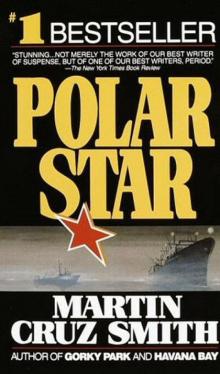 Polar Star
Polar Star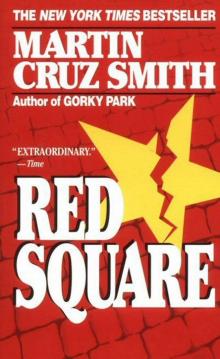 Red Square
Red Square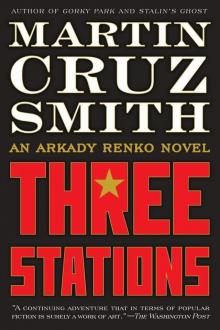 Three Stations
Three Stations Wolves Eat Dogs
Wolves Eat Dogs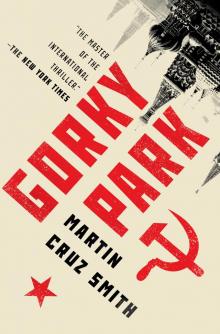 Gorky Park
Gorky Park December 6
December 6 Havana Bay
Havana Bay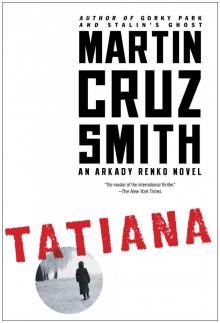 Tatiana
Tatiana The Girl From Venice
The Girl From Venice Stalin's Ghost
Stalin's Ghost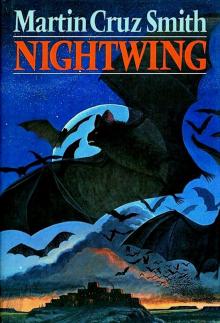 Nightwing
Nightwing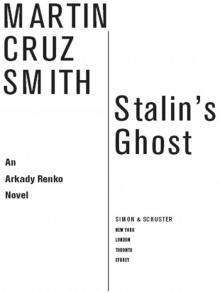 Stalin s Ghost
Stalin s Ghost Gypsy in Amber
Gypsy in Amber Rose
Rose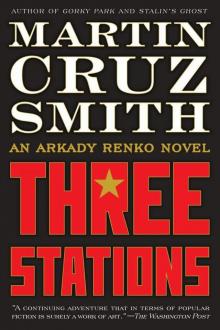 Three Stations: An Arkady Renko Novel
Three Stations: An Arkady Renko Novel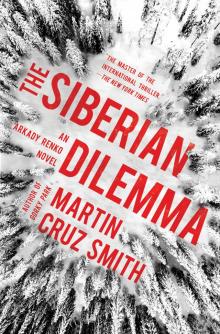 The Siberian Dilemma
The Siberian Dilemma December 6 (V5.0)
December 6 (V5.0)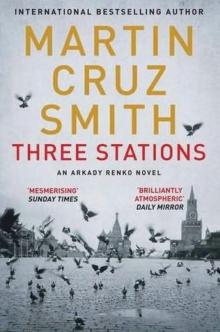 Three Stations ar-7
Three Stations ar-7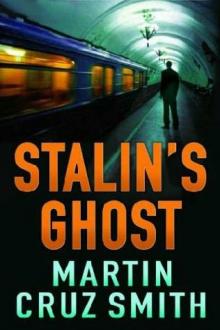 Stalin’s Ghost ar-6
Stalin’s Ghost ar-6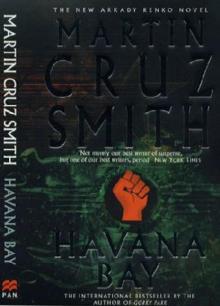 Havana Bay ar-4
Havana Bay ar-4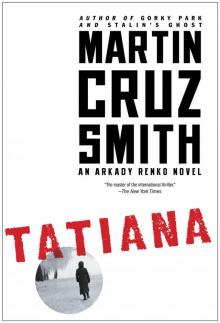 Tatiana ar-8
Tatiana ar-8